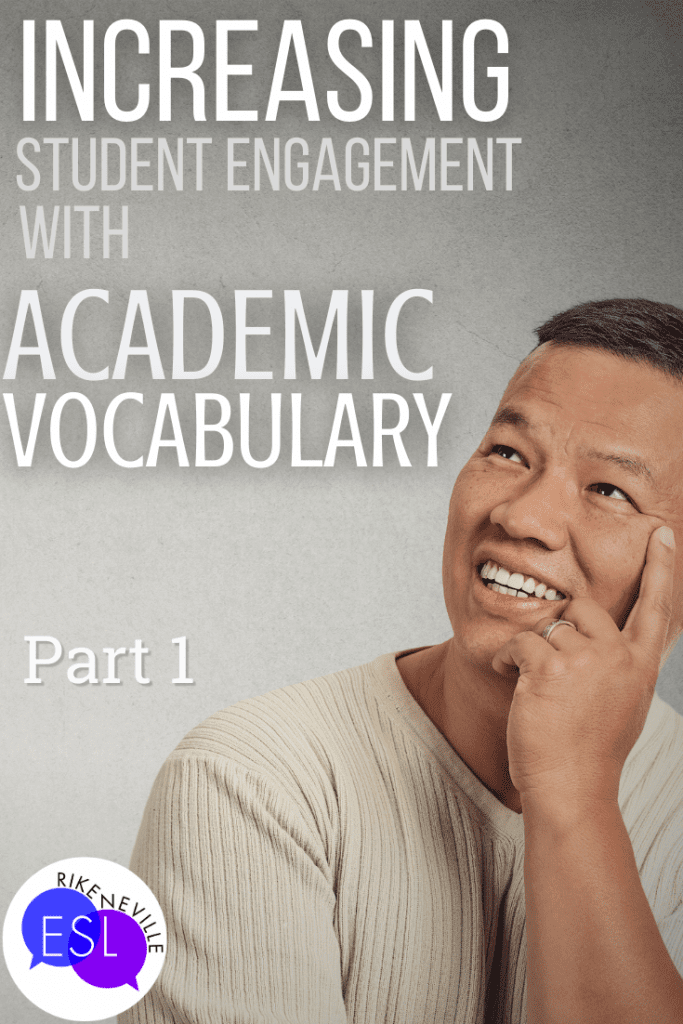
Help! My academic vocabulary students just don’t get it that a substantial vocabulary is necessary for more than passing English proficiency exams!
This was an issue that came up over and over, and my co-workers and I were constantly hashing out just how we could convince students that passing the TOEFL wasn’t enough to guarantee they could do well in university.
What if they think basic communication is good enough?
I hear you! So many of my adult and young adult students wanted a quick way to “learn” a lot of academic vocabulary…long enough to pass their English proficiency exam. I won’t even tell you how many honestly thought they’d never need those words again and that they would not need to continue learning more not just while they were in university, but even after!
So what can we do?
Sell them on free time instead of vocabulary.
These weren’t the students who practically ate academic vocabulary for breakfast. These were the students who wanted to know it but not study it. They needed a different incentive. So, for my university-bound students, I brought it back to something they could readily understand—free time. I asked them if they would rather spend most of their university years in the library studying or if they also wanted to participate in clubs (granted, they probably heard that as go to clubs), hang out with their friends, and have time for romance.

NONE were enthusiastic about having a designated spot in the library. Then I explained that they would be able to express themselves better during the required participation in their classes (which would translate to higher grades) and increase their processing. That really got them. Knowing they would spend LESS time on homework and finish exams FASTER was a significant motivator.
What if they aren’t university-bound?
What do you tell them? THIS.
Research and countless studies have proven that a good vocabulary is one of the best predictors for career success.

That same research and those same studies also found that vocabulary is a precursor to achievement, not a consequence. If they don’t then make the connection to higher salaries, I’ll be surprised.
Now, we all know that reading is one of the absolute BEST ways (okay, it just might be THE best way) to increase vocabulary. And we always tell our students that, right?
If your students are anything like mine, they were not bookworms in a previous life, don’t have a library card now, and can’t remember the last book they read from cover to cover without being required to. They also might be a bit suspicious that reading just ANY book will help them…and they could be right!
At this stage in their lives, they might never learn to love reading, and as much as it hurts me to say this…that’s okay!
Try this.

- Tell your university-bound students to read books and internet articles connected to what they plan to major in or even what they think they might major in. This will expose them to terminology that they will need to know once they are in university. They are likely already interested in whatever they plan to major in, so this increases their chances of doing the reading.
- Tell your other students to read books and internet articles that are connected to the jobs they WANT to have…not the jobs they currently have. This is a bit like dressing for the job you want. Learn the vocabulary for the job you want. Reading trade books, research journals, biographies of leading people in the field, or even related novels will help them get where they want to be in their chosen field.
Are they still not buying it?
If you’ve tried all the suggestions I mentioned, and you’re still getting nowhere, it’s time to pivot. Find out how to implement video/audio in Part 2 of Increasing Student Engagement in Academic Vocabulary.
If you’re looking for some academic vocabulary resources, check out my line of 400 must-have words for students studying for English proficiency exams.
Read more about teaching adult ESL!
- How to Increase Student Engagement with Academic Vocabulary Part 2: Using Videos
- Stop Pre-Teaching Vocabulary All the Time!
- Two Engaging Multi-Level Vocabulary Games for Adult ESL
- Learning New Vocabulary: 3 Reasons Adult ESL Students Struggle
- 3 Legitimate Reasons Commonly Confused Words Often Confuse Us
- 3 Vocabulary Games your Adult Students will LOVE?

Leave a Reply